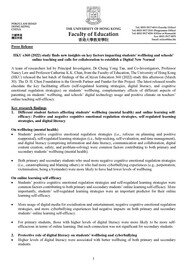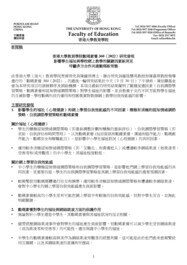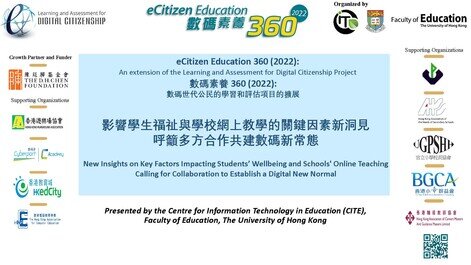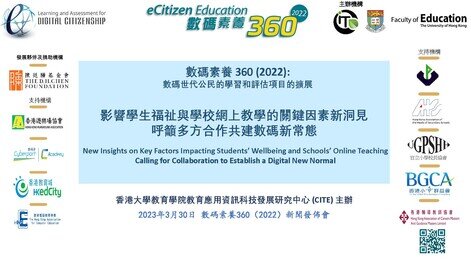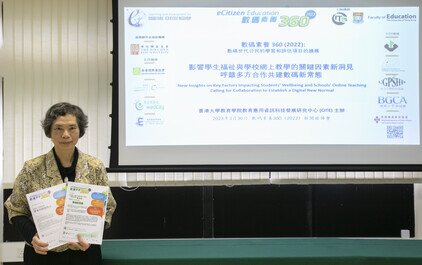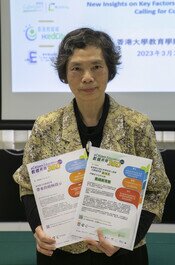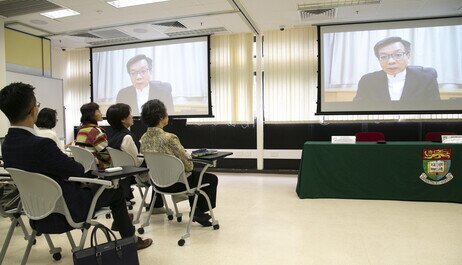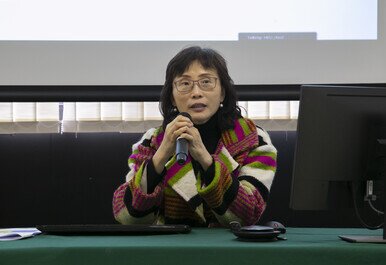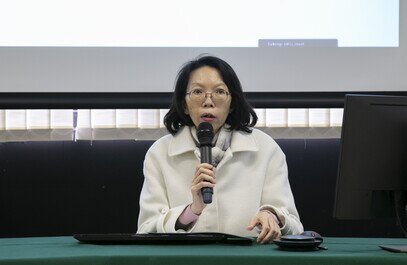Press Release: HKU e360 (2022) study finds new insights on key factors impacting students’ wellbeing and schools’ online teaching and calls for collaboration to establish a Digital New Normal
新聞稿:香港大學教育學院數碼素養 360(2022)研究發現 影響學生福祉與學校網上教學的關鍵因素新洞見 呼籲多方合作共建數碼新常態
Updated on March 30, 2023 (Thu)
HKU e360 (2022) study finds new insights on key factors impacting students’ wellbeing and schools’ online teaching and calls for collaboration to establish a Digital New Normal
A team of researchers led by Principal Investigator, Dr Cheng Yong Tan, and Co-Investigators, Professor Nancy Law and Professor Catherine K.K. Chan, from the Faculty of Education, The University of Hong Kong (HKU) released the last batch of findings of the eCitizen Education 360 (2022) study this afternoon (March 30). The D. H. Chen Foundation is the Growth Partner and Funder for this Project. The latest released results elucidate the key facilitating effects (self-regulated learning strategies, digital literacy, and cognitive emotional regulation strategies) on students’ wellbeing, complementary effects of different aspects of parenting on students’ wellbeing, and schools’ digital technology usage and positive climate on teachers’ online teaching self-efficacy.
Key research findings
- Different student factors affecting students’ wellbeing (mental health) and online learning self-efficacy: Positive and negative cognitive emotional regulation strategies, self-regulated learning strategies, and digital literacy
On wellbeing (mental health)
- Students’ positive cognitive emotional regulation strategies (i.e., refocus on planning and positive reappraisal), self-regulated learning strategies (i.e., help-seeking, self-evaluation, and time management), and digital literacy (comprising information and data literacy, communication and collaboration, digital content creation, safety, and problem-solving) were common factors contributing to both primary and secondary students’ wellbeing (mental health).
- Both primary and secondary students who used more negative cognitive emotional regulation strategies (i.e., catastrophising and blaming others) or who had more cyberbullying experiences (e.g., perpetration, victimisation, being a bystander) were more likely to have had lower levels of wellbeing.
On online learning self-efficacy
- Students’ positive cognitive emotional regulation strategies and self-regulated learning strategies were common factors contributing to both primary and secondary students’ online learning self-efficacy. More importantly, students’ self-regulated learning strategies were an important predictor for their online learning self-efficacy.
- More usage of digital media for socialisation and entertainment, negative cognitive emotional regulation strategies, and more cyberbullying experiences had negative impacts on both primary and secondary students’ online learning self-efficacy.
- For primary students, those with higher levels of digital literacy were more likely to be more self-efficacious in terms of online learning. But such connection was not significant for secondary students.
- Protective role of digital literacy on students’ wellbeing and cyberbullying
- Higher levels of digital literacy were associated with better wellbeing of both primary and secondary students.
- While experiencing cyberbullying had negative impacts on students’ wellbeing, digital literacy could reduce the probability of students experiencing cyberbullying (perpetration and victimisation) and thus protecting both primary and secondary students’ wellbeing.
- For secondary students, the association between digital literacy and cyberbullying bystander experiences could be due to their increasing usage of the internet and awareness of cyberbullying.
- Students’ socioeconomic status (SES) affected students’ digital literacy, their use of digital media for socialisation and entertainment, their adoption of self-regulated learning strategies, cognitive emotional regulation strategies, and the extent of cyberbullying experiences that they might have.
- Primary and secondary students’ SES was a strong predictor of their’ digital literacy, positive cognitive emotional regulation strategies, and self-regulated learning strategies.
- Secondary students with higher SES were more likely to have more online socialisation and entertainment activities.
- Primary students with higher SES were more likely to have fewer cyberbullying experiences.
- Of the different parenting practices, good parent-child relationship was the strongest predictor of students’ wellbeing. Digital parenting, parental home-based involvement, and parental school-based involvement had relatively weaker impact on students’ outcomes.
- All four different aspects of parenting, including parent-child relationship, digital parenting (i.e., parents’ understanding of good digital practices, such as how to use online resources productively and minimising risks, parents as role models and setting rules for media use in the family), parental home- and school-based involvement, contributed to students’ intermediate outcomes, especially on cognitive emotional regulation strategies and self-regulated learning strategies.
- Different aspects of parenting were inextricably related to one another, and having good parent-child relationships was the strongest predictor for students’ learning and wellbeing.
- Digital parenting, parental home- and school-based involvement had little impact on students’ learning and wellbeing.
- SES positively related to parent-child relationship, digital parenting, and parental home-based involvement.
- Schools’ digital technology usage and positive climate are keys to develop teachers’ online teaching self-efficacy
Two pathways contributed to teachers’ online teaching self-efficacy (i.e., teachers’ self-reported confidence in conducting online lessons, utilising digital resources, integrating digital technologies to facilitate learning, and achieving their teaching goals):
- School leaders’ usage of digital technology for teaching and learning was positively related to teachers’ usage of digital technology for teaching and learning, which then strengthened their online teaching self-efficacy. Therefore, role-modelling by school leaders and mastery experiences from teachers’ increased digital technology usage might have contributed to their online teaching self-efficacy.
- Positive energy, trust and collaboration in schools were positively associated with teacher collaboration, which then strengthened their online teaching self-efficacy. Therefore, trust and collaboration created a positive climate and it contributed to teachers’ online teaching self-efficacy.
Recommendations
Based on the above research findings, the team made the following recommendations for students, parents, schools and the community to better adapt to the Digital New Normal:
For students: Students should be equipped with self-regulated learning strategies and positive cognitive emotional regulation strategies to facilitate their wellbeing. Students should be encouraged to participate in activities that can develop their digital literacy and master strategies to prevent and respond to cyberbullying.
For parents: Parents should focus on cultivating a positive relationship with their children to support their online learning and wellbeing. Parents need to adopt a holistic approach in their parenting, and there is a great deal of scope in digital parenting, parental home- and school-based involvement to explore how to effectively support students’ online learning and wellbeing. Moreover, parents should encourage and teach their children strategies for managing their emotions and focusing on goals, to develop their abilities of self-regulated learning and cognitive emotional regulation.
- For schools: Schools should encourage wider usage of digital technology, and cultivate a positive school climate (i.e., positive energy, trust and collaboration) to facilitate teacher collaboration, so that teachers can be more efficacious in online teaching. In addition, schools should adopt appropriate strategies to enhance students’ digital literacy and provide opportunities for them to master self-regulated learning strategies and positive cognitive emotional regulation strategies. Schools should also explore with parent-teacher associations and relevant social organisations on how parents can be supported to improve the effectiveness of different aspects of parenting.
- For the community: The whole community including relevant professionals, community members, business and governmental organisations, should be further involved to harness their expertise, resources or services not just to provide students with emotional and social support, but also to help parents on effective parenting practices (including general and digital parenting), and to provide support for school development, especially in students’ wellbeing.
The participating schools in this study were located widely from 16 districts in Hong Kong, involving 2,014 students from 20 primary schools and 6,014 students from 31 secondary schools. Meanwhile, responses from 1,024 parents of primary students and 1,875 parents of secondary students could be matched with their children’s survey responses and were included in this project. Additionally, 886 teachers and 271 school leaders also participated in this study. The data collection of this study was conducted from July to early September 2022.
Respondents
- Mr So Ping Fai, Principal, Tin Shui Wai Methodist Primary School
- Dr Lee Nam Yuk, Amelia, Associate Dean (Programmme Development) and Head (Early Childhood and Elementary Education), School of Continuing Education, Hong Kong Baptist University
- Dr Ng Ka Man, Principal, Hong Kong True Light College
Project Team
Principal Investigator
- Dr Cheng Yong Tan, Associate Professor, Academic Unit of Social Contexts and Policy of Education (SCAPE), Faculty of Education, HKU>
Co-Investigators
- Professor Nancy Law, Associate Dean (Research), Professor, Academic Unit of Teacher Education and Learning Leadership, and Deputy Director, Centre for Information Technology in Education (CITE), Faculty of Education, HKU
- Professor Catherine K.K. Chan, Academic Unit of SCAPE, Faculty of Education, HKU
- Dr Min Lan, Lecturer, College of Teacher Education, Zhejiang Normal University
- Dr Qianqian Pan, Research Scientist, National Institute of Education, Nanyang Technological University
- Dr Sisi Tao, Post-doctoral Fellow, CITE, Faculty of Education
Post-doctoral Fellow
- Dr Qianru Liang, Post-doctoral Fellow, CITE, Faculty of Education, HKU
Project Manager
- Miss Sophie Wenhui Li, CITE, Faculty of Education, HKU
Research Assistant
- Miss Cassie Yimeng Li, CITE, Faculty of Education, HKU
For more details of the first release of findings of eCitizen Education 360 (2022), please visit https://web.edu.hku.hk/press/press-release-ecitizen-education-360-221103. For more details of the “eCitizen Education 360 (2022)” Project and the report, please visit https://www.ecitizen.hk/360. For more details of the “eCitizen Education 360 (2020)” Project, please visit https://www.ecitizen.hk/360/e360-2020.
For media enquiries, please contact Ms Emily Cheung, Senior Manager (Development and Communications), Faculty of Education, HKU (Tel: 3917 4270 / Email: emchy@hku.hk), or Miss Sophie Li, Project Manager, “eCitizen Education 360 (2022)” Project, Faculty of Education, HKU (Tel: 3917 4759 / Email: dcitizen@hku.hk).
March 30, 2023
香港大學教育學院數碼素養 360(2022)研究發現
影響學生福祉與學校網上教學的關鍵因素新洞見
呼籲多方合作共建數碼新常態
由香港大學(港大)教育學院首席研究員陳鐘榮博士、聯合研究員羅陸慧英教授和陳嘉琪教授領導進行的「數碼素養360(2022)」的最後一輪研究結果於今天(3月30日)下午發佈。陳廷驊基金會為本研究項目的發展夥伴及捐助機構。本項目最新的研究結果闡明了關鍵促進因素(自我調節學習策略,數碼素養和認知情緒調節策略)對學生福祉的影響,家長教養子女的不同方面對學生福祉的互補影響,學校數碼科技的運用和校園氛圍對教師網上教學自我效能感的影響。
主要研究發現
- 影響學生的福祉(心理健康)和網上學習自我效能感的不同因素:積極和消極的認知情緒調節策略、自我調節學習策略和數碼素養
關於福祉(心理健康)
- 學生的積極認知情緒調節策略(即重新調整計劃和積極的重新評估)、自我調節學習策略(即求助、自我評估和時間管理),以及數碼素養 (包括資訊和數據素養、溝通和協作能力、數碼創作能力、數碼安全和解難能力),是影響中小學生福祉狀況(心理健康)的共同因素。
- 運用較多消極認知情緒調節策略(即「災難化」和責備他人)或遭遇較多網絡欺凌(如欺凌者、受害者和/或旁觀者)的中小學生,其福祉程度較低。
關於網上學習自我效能感
- 中小學生的積極認知情緒調節策略和自我調節學習策略,是影響他們網上學習自我效能感的共同因素。更重要的是,學生的自我調節學習策略是其網上學習自我效能感的重要預測因素。
- 較頻繁使用數碼媒體進行社交和娛樂、運用較多消極認知情緒調節策略和遭遇較多網絡欺凌,會對中小學生的網上學習自我效能感產生負面影響。
- 數碼素養較高的小學生更有可能在網上學習中有較強的自我效能感,但對中學生而言,並無此明顯關聯。
- 數碼素養對學生的福祉與網絡欺凌方面的保護作用
- 無論對於小學生還是中學生,其數碼素養與其福祉狀況均呈正相關。
- 儘管經歷網絡欺凌事件會對學生的福祉產生負面影響,但數碼素養可以減少學生受到網絡欺凌(成為欺凌者和受害者)的可能性,進而保護中小學生的福祉。
- 中學生的數碼素養較高與其作為網絡欺凌旁觀者的經歷有關,這可能是由於他們愈來愈頻繁使用互聯網,以及其網絡欺凌的意識有所提高。
- 學生的社會經濟地位(社經地位)影響其數碼素養、影響他們使用數碼社交和網上娛樂、運用自我調節學習策略、認知情緒調節策略,以及遭遇網絡欺凌的程度。
- 無論是小學生或中學生,他們的社經地位都是對其數碼素養、積極認知情緒調節策略,及自我調節學習策略的有力預測因素。
- 社經地位較高的中學生較有可能在網上參與較多的社交和娛樂活動。
- 社經地位較高的小學生較有可能遭遇較少網絡欺凌。
- 在不同的子女教養實踐中,良好的親子關係是學生福祉的最強預測因素。數碼育兒、家長家中管教參與度和家校事務參與度,對學生福祉的影響相對較弱。
子女教養的四個不同方面,包括親子關係、數碼育兒(即家長了解良好的數碼實踐,例如如何有建設性地使用網上資源並降低網上風險,訂立上網和使用媒體方面的家規並以身作則)、家長家中管教參與度和家校事務參與度,均有助於學生的中間結果,尤其認知情緒調節策略和自我調節學習策略。
子女教養的不同方面互有緊密關聯,良好的親子關係是學生學習和福祉最強的預測因素。
數碼育兒、家長家中管教參與度,以及家校事務參與度對學生的學習和福祉的影響不大。
社經地位對親子關係、數碼育兒和家中管教參與度有正面預測作用。
- 學校對數碼科技的運用和積極的校園氛圍是促進教師網上教學自我效能感的關鍵因素
以下兩種學校層面的渠道有助促進教師網上教學的自我效能感(即教師對進行網上課堂、利用數碼資源、整合數碼科技以促進學習,以及實現教學目標的自信程度):
- 學校領導層在教學上對數碼科技的運用與教師在教學方面運用數碼科技呈正相關,進而增強教師的網上教學自我效能感。因此,學校領導層作為楷模發揮的示範作用,加上掌握了教師加强數碼科技運用的部份成功經驗,或有益於提升教師網上教學的自我效能感。
- 正能量、信任與合作對教師的同儕協作有正向預測作用,並能增強教師網上教學的自我效能感。因此,信任與合作營造了積極的校園氛圍,有助於提高教師網上教學的自我效能感。
建議
根據研究結果,研究團隊為學生、家長、學校及社區更好適應數碼新常態作出以下建議:
- 對於學生:學生應具備運用自我調節學習策略與積極認知情緒調節策略的能力,以促進其福祉。應鼓勵學生參與有助於促進其數碼素養能力的活動,掌握防範和應對網絡欺凌的策略。
- 對於家長:家長需注重培養與孩子的良好關係,支援他們的網上學習和福祉。家長教養子女需採取全面綜合方式,在數碼育兒、家中管教及家校管教參與方面,探索如何更有效促進學生的網上學習和福祉。家長也應鼓勵和教導子女管理情緒和專注目標的策略,以發展他們自我調節學習和認知情緒調節的能力。
- 對於學校:學校應鼓勵更廣泛地運用數碼科技,營造積極的校園氛圍(即正能量、信任與合作),並促進教師同儕協作,使教師在網上教學更有信心。此外,學校應採取合適策略提升學生的數碼素養, 並提供機會讓他們掌握自我調節學習策略和積極認知情緒調節策略。學校應與家教會及相關社會組織共同探索如何協助家長提高教養子女各方面的效能。
- 對於社區:整個社區,包括相關專業人士、社區團體、企業和政府機構等應加強合作,進一步運用其專業技能、資源和服務,不僅為學生提供情感和社會支援,並幫助家長實踐有效教養子女的方法(包括一般育兒和數碼育兒),並為學校發展(尤其學生福祉方面)提供支援。
參與本研究的學校遍佈全港16區,包括來自20所小學的2,014名學生和31所中學的6,014名學生。其中1,024名(小學)和1,875名(中學)的家長問卷回應,與其子女的問卷回應吻合。此外,共有886名教師和271名學校領導也參與了本項目。是次問卷調查於2022年7月至9月初進行。
回應者
- 天水圍循道衞理小學校長蘇炳輝先生
- 香港浸會大學持續教育學院副院長(課程拓展)暨總監(幼兒及基礎教育)李南玉博士
- 香港真光書院校長吳嘉文博士
研究團隊
首席研究員
- 港大教育學院教育政策與社會學部副教授陳鐘榮博士
聯合研究員
- 港大教育學院副院長(研究)、教師教育及學習領導學部教授及教育應用資訊科技發展研究中心副主任羅陸慧英教授
- 港大教育學院教育政策與社會學部陳嘉琪教授
- 浙江師範大學教育學院講師藍敏博士
- 南洋理工大學國立教育學院研究科學家潘前前博士
- 港大教育學院教育應用資訊科技發展研究中心博士後研究員陶思思博士
博士後研究員
- 港大教育學院教育應用資訊科技發展研究中心梁倩茹博士
項目經理
- 港大教育學院教育應用資訊科技發展研究中心黎文暉小姐
研究助理
- 港大教育學院教育應用資訊科技發展研究中心李逸萌小姐
有關「數碼素養360(2022)」計劃的首輪研究結果,請瀏覽 https://web.edu.hku.hk/press/press-release-ecitizen-education-360-221103。有關「數碼素養360(2022)」計劃的詳情及報告,請瀏覽https://ecitizen.hk/360。有關「數碼素養360(2020)」研究計劃,請瀏覽https://www.ecitizen.hk/360/e360-2020。
傳媒查詢,請聯絡香港大學教育學院高級經理張可恩女士(電話:3917 4270 / 電郵︰[javascript protected email address])或香港大學教育學院「數碼素養360(2022)」項目經理黎文暉小姐(電話︰3917 4759 / 電郵︰[javascript protected email address])。
2023年3月30日

